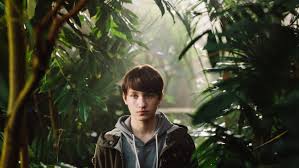Eye For Film >> Movies >> The Erlprince (2016) Film Review
The Erlprince
Reviewed by: Amber Wilkinson

Kuba Czekaj returns to the themes of adolescence that he explored in Baby Bump in The Erlprince, which is technically his feature debut, despite being released long after Baby Bump made its premiere as part of the Venice Biennale College. He began it before making the cut for the mentorship programme with Baby Bump, and finished afterwards, but the preoccupations that dominate that movie are related to the ideas he explores here.
Baby Bump is chiefly about the physical changes kids experience as they are growing up, the way that your body suddenly starts doing 'it's own thing' and how frightening that can be. The Erlprince, meanwhile, is more about the shifting psychological landscape of being a teenager and is a much more moody beast.

Where Baby Bump was played for cartoonish laughs, The Erlprince has a teenage, gothic vibe, as though the kid in Baby Bump had swapped his Disney animations and comic books for Marilyn Manson and My Chemical Romance. The dark comedy of Baby Bump is replaced by dramatic angst as the unnamed Boy (Staszek Cywka) tests the boundaries of the relationship with his domineering Mother (Agnieszka Podsiadlik) and his father, credited here as the Man (Sebastian Lach). Drawing on Goethe's The Erlking adds a poetic and ethereal element to the action, which features fairy tale segments.
The amplification of adolescence is fully illustrated when a suggestion that the world is due to end in 12 days on the radio becomes just one of several obsessions for the boy, who we learn is very intelligent, poor at relationships but good at probing notions of parallel universes - although like so much of the film, this could be 'all in the mind'. The boy feels everything acutely, whether it is the borderline-Oedipal danger represented by his mother, the pressure of the responsibilities of adulthood represented by his father or simply sexual urges. Apocalypse or not for the rest of humanity, the world as he knows it is most certainly coming to an end.
The film is driven less by story - which is deliberately disconcerting and fractured - than by its atmosphere. Cinematographer Adam Palenta puts in sterling work, whether it is capturing the slick monotony of a neon-lit motorway on a raining night or the otherworldly landscape the boy visits when his reality begins to crack. Although Czekaj's films may initially seem chaotic, there is a fierce directorial control in evidence, from the colours employed - which make particularly good use of 'light' and 'dark' imagery - to the oppressive mood. We see the boy face the agonies of choice, in the complex way that every adolescent must pick their own path to adulthood, selecting those in authority they want to listen to or cast aside and ultimately finding some sort of faith in their own beliefs. We don't just see this teenager grow up, we are buffeted and tossed by the experience.
Reviewed on: 03 May 2017














